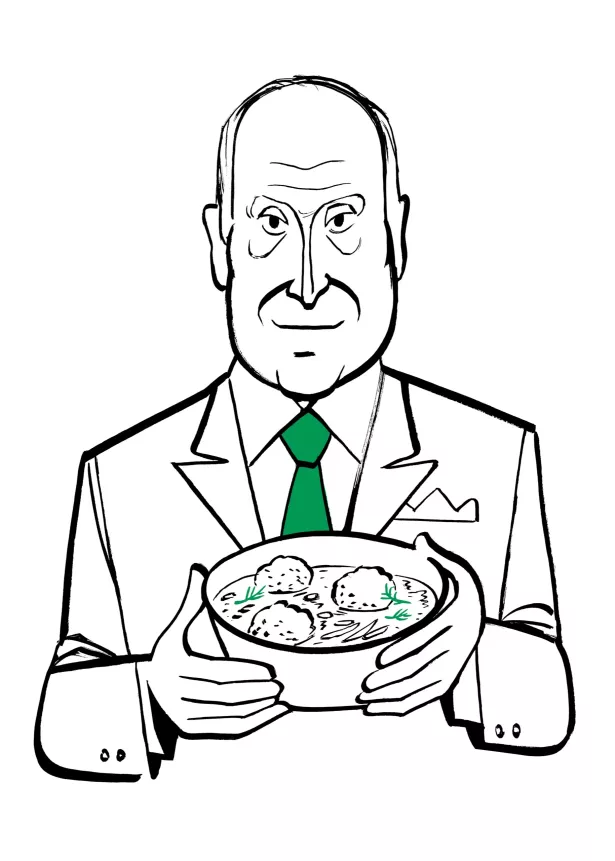“As far as matzo-ball soup, my mother made the best,” Ronald Lauder said the other night on the Upper East Side, in the bookshop of the Neue Galerie, the art museum he founded. Lauder, seventy-eight, the younger son of Estée and Joseph Lauder, and a billionaire heir to their cosmetics fortune, was there to celebrate the publication of a cookbook. “Honey Cake and Latkes: Recipes from the Old World by the Auschwitz-Birkenau Survivors” was organized by the Auschwitz-Birkenau Memorial Foundation, of which he is the chairman.
In the shop, before the book’s launch, Lauder sat with a handful of its contributors. How did the idea originate? “When you’re dealing with survivors, when you’re dealing with Jews, everyone has a different version of events,” he said. “But there’s only one version that’s correct, and that’s mine.” In January of 2020, Lauder had invited a hundred and twenty survivors to visit Auschwitz-Birkenau on the seventy-fifth anniversary of its liberation. At dinner one night, talk turned to gefilte fish. The group stayed in touch. Maria Zalewska, the foundation’s Polish-born director, began to gather recipes.
More than one survivor remembers sustaining fellow-prisoners with vivid descriptions of the foods they’d eaten in their earlier lives. Tova Friedman (kasha varnishkes, carrot tzimmes), a sprightly eighty-four- year-old with a silvery-blond bob, was "ve and a half when she was sent to Auschwitz. “Food is home,” she said. “And if you talk about it the smell comes to you and home comes back.”
Eugene Ginter, eighty-three, who was liberated just before he turned six, had a more complicated relationship with smells. “When I came in Auschwitz,” he recalled, “I looked through the wooden slats of the cattle car, and I said, ‘It’s very pretty,’ because it had trees. But then the smell, it was a sweet smell. It was the human bodies being burned.” Ginter’s contributions to the book are the foods his mother made after the war, to fatten his emaciated frame: dark chocolate shaved over buttered black bread; a boiled potato mashed with buttermilk; kogel mogel, whipped egg whites beaten with yolks and sugar.
Across the hall, in Café Sabarsky, servers circulated with trays of champagne and bite-size versions of some of the book’s recipes: Elisabeth Citrom’s eggplant salad with crispy rye croutons; David Marks’s rakott krumpli, Hungarian layered potatoes with cheese; Goldie Finkelstein’s rugelach. Sitting on a banquette, Lois Flamholz, ninety-four, a survivor who was born in Czechoslovakia, looked at a photograph of herself in the book in which she presses circles of dough together for jelly cookies. “I miss those cookies!” she cried. “I can’t stand,” she explained. “I stopped cooking, I stopped baking.”
On another banquette, the actor and director Joel Grey recounted, to the producer Jeffrey Seller, his experience filming “Cabaret” in Germany, in 1971. “I was terrified on the flight,” he said. “I stepped off the airplane, stood on the ground, and wept.”
Lauder moved to a lectern. “The "first title of the book was ‘Auschwitz Recipes,’ ” he said. “It didn’t go too far.” Midway through his thank- yous, he turned toward the door. “Before I say anything else, a very special woman is coming in now, Marion Wiesel.” He went on, “It was Marion who I called to get the recipe from her husband, Elie.
And, today, the latkes that you ate were from Elie’s recipe.”
The latke recipe was, unusually, absent onions. Later, a pushy interlocutor asked Mrs. Wiesel, ninety-one, a survivor herself, and a gifted translator, if it was true that her late husband didn’t care for them. She said, “I can’t believe you’re interested in whether or not he liked onions.” Elisha, the Wiesels’ son, said, “My father preferred to focus on the positive. So rather than an onion-hater, I would think of him as a chocolate-lover.” According to family lore, Marion had ensnared Elie with her latkes, and also bribed him into quitting smoking by promising him a Jaguar. “There was no Jaguar,” Elisha said.
In the lobby, on the way out, Tova Friedman, whose TikTok account, TovaTok, has nearly half a million followers, held court. Thanks to her new memoir, “The Daughter of Auschwitz,” she’s been invited around the world to tell her story. “So they took us to this . . . high tea,” she said, describing a visit to London. “We got that thing, full of little sandwiches. So I said, ‘What happened to the crust? That’s the best part of the bread!’ ” She went on, “You eat your soggy white bread, I got an idea. I’m gonna invent chai tea,” as in the Hebrew word for life, pronounced gutturally. “It’s gonna be rye toast, with crusts, and it’s gonna be lox. It’s gonna be gefilte fish.” ♦


Spread the word